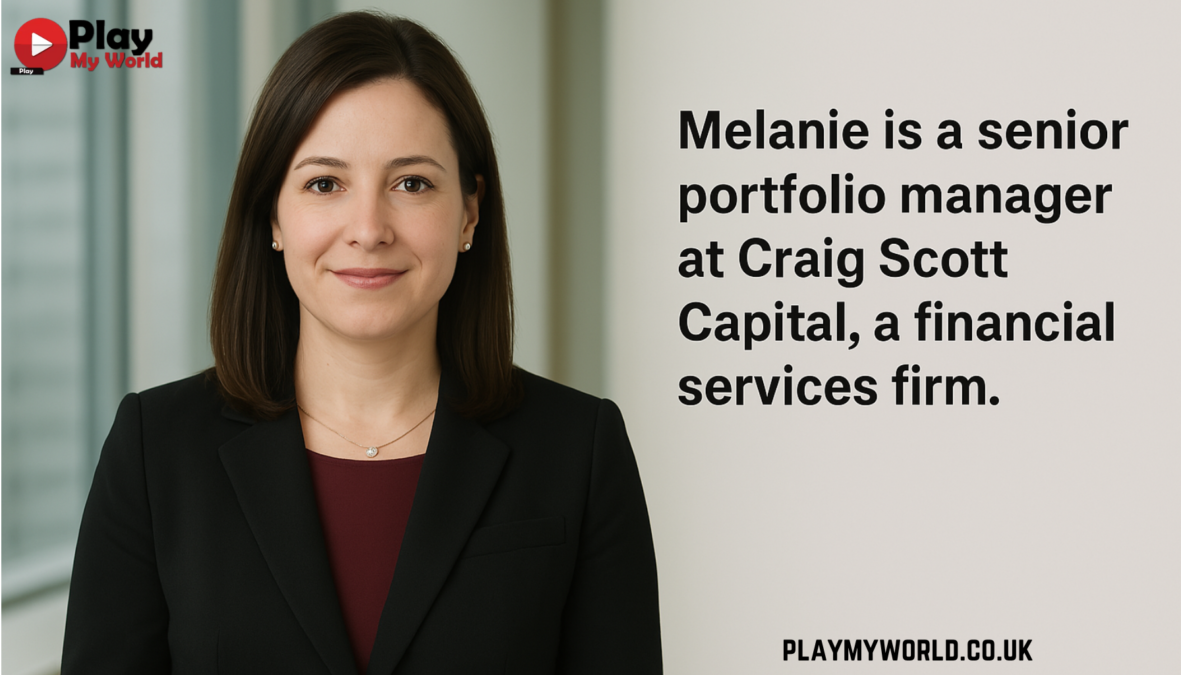Introduction: Why Melanie at CraigScottCapital Matters Today
The phrase Melanie at CraigScottCapital may seem like a small footnote in the world of finance, but it tells a much deeper story about professionalism, ethics, and the challenges of working within a complex financial system. Melanie’s role at the now-defunct brokerage firm CraigScottCapital provides a lens through which we can better understand the inner workings of investment advisory firms, the importance of regulatory compliance, and how individual advisors operate within larger institutions.
This article explores Melanie’s position, the rise and fall of CraigScottCapital, and the important lessons it offers for both investors and financial professionals.
Who Was Melanie at CraigScottCapital?
Melanie served as a senior portfolio manager at CraigScottCapital. Her position involved developing investment strategies tailored to client needs, managing financial portfolios, and leading a team of analysts and advisors. Her approach was reportedly grounded in transparency, ethical standards, and a deep understanding of client objectives.

One key aspect of Melanie’s strategy was her interest in sustainable investing. She favored incorporating ESG (Environmental, Social, and Governance) criteria into investment portfolios—a growing trend in the financial world aimed at aligning financial goals with broader social and environmental values.
Despite the firm’s eventual regulatory issues, Melanie’s individual performance was seen by many clients as professional and client-focused, suggesting she worked diligently within a troubled organization.
Also Read: Melanie from CraigScottCapital: A Comprehensive Insight into Her Role and the Firm’s History
The Story of CraigScottCapital: From Promise to Regulatory Collapse
CraigScottCapital began as a registered broker-dealer offering trading and wealth management services. It aimed to serve both retail and institutional investors with a promise of personalized financial solutions. However, serious internal issues ultimately led to its downfall.
In 2017, the Financial Industry Regulatory Authority (FINRA) expelled CraigScottCapital from the securities industry. The decision followed multiple findings of non-compliance, including:
- Failure to supervise its brokers
- Recommending unsuitable investment strategies
- Excessive trading activity to generate commissions
- Inaccurate recordkeeping and failure to report customer complaints
These violations were severe enough to result in permanent expulsion from the industry. Although Melanie was not publicly named in any of the regulatory actions, she, like many professionals at the firm, had to manage the reputational and career-related fallout from the firm’s closure.
What the Case of Melanie at CraigScottCapital Teaches Us
The situation involving Melanie and CraigScottCapital highlights a broader truth in financial services: even well-intentioned, capable professionals can be affected by the ethical or operational failures of their firm.
Key lessons include:
- The reputation of a financial firm directly impacts its employees and clients.
- Transparency, ethics, and regulatory compliance are not optional—they are foundational.
- Investors must not only evaluate their advisors but also the firms behind them.
- Financial professionals should continue to uphold their values, even in challenging environments.
Melanie’s case is a reminder that ethical integrity can and should be maintained, regardless of the circumstances.
Step-by-Step Guide: Choosing the Right Financial Advisor
To avoid potential risks associated with firms like CraigScottCapital, investors should follow a deliberate process when choosing a financial advisor.
Step 1: Verify Credentials and Background
Use tools like FINRA’s BrokerCheck or the SEC’s Investment Adviser Public Disclosure database to research the advisor’s licensing history, regulatory records, and client complaints.
Step 2: Understand the Fee Structure
Ask whether the advisor is fee-only, commission-based, or a hybrid. Fee-only advisors typically have fewer conflicts of interest.
Step 3: Assess Investment Philosophy
Find out if the advisor offers personalized strategies, believes in long-term investing, and whether they consider ESG criteria if that aligns with your values.
Step 4: Ask the Right Questions
Inquire about how they handle risk, how often they communicate with clients, and whether they act as a fiduciary—meaning they are legally obligated to act in your best interest.
Step 5: Read Reviews and Testimonials
Look for reviews from verified clients and be cautious of advisors or firms with a history of excessive complaints or disciplinary actions.
Life After CraigScottCapital
After the closure of CraigScottCapital, there is limited public information about Melanie’s career path. However, it is not uncommon for experienced professionals to transition to independent advisory roles, boutique firms, or wealth management companies with a stronger ethical foundation.
Professionals like Melanie who demonstrate dedication to clients and a commitment to transparency often rebuild and continue their careers successfully, drawing on lessons learned from past experiences.
Also Read: Guiadonegociodigital: The Ultimate Guide to Building Your Digital Business Success
Conclusion: The Lasting Impact of Melanie at CraigScottCapital
The story of Melanie at CraigScottCapital underscores the importance of individual ethics in the broader financial system. It also highlights the need for vigilance when choosing financial partners, and the risks associated with firms that fail to meet regulatory and ethical standards.
For investors, the case reinforces the value of doing thorough research—not just on the advisor, but on the firm they represent. For financial professionals, it offers a powerful example of why maintaining personal integrity matters, even when the corporate environment falls short.
Frequently Asked Questions
1. Was Melanie directly involved in CraigScottCapital’s regulatory violations?
No public information suggests Melanie was personally involved in the violations that led to the firm’s expulsion. Her role was focused on portfolio management and client service.
2. What was CraigScottCapital penalized for?
CraigScottCapital was expelled by FINRA for serious regulatory failures, including lack of supervision, unsuitable investment recommendations, and failure to maintain proper records.
3. What is ESG investing and why did Melanie focus on it?
ESG investing involves selecting investments based on environmental, social, and governance factors. Melanie’s reported interest in ESG reflected a broader commitment to responsible, long-term investing.
4. How can I avoid choosing an advisor from a problematic firm?
Always verify the advisor and the firm through BrokerCheck or the SEC’s adviser database. Look at licensing, complaint history, and regulatory disclosures.
5. What happened to professionals like Melanie after the firm closed?
Many professionals seek roles at more reputable firms, become independent advisors, or transition into new roles while leveraging their past experience and client trust.




